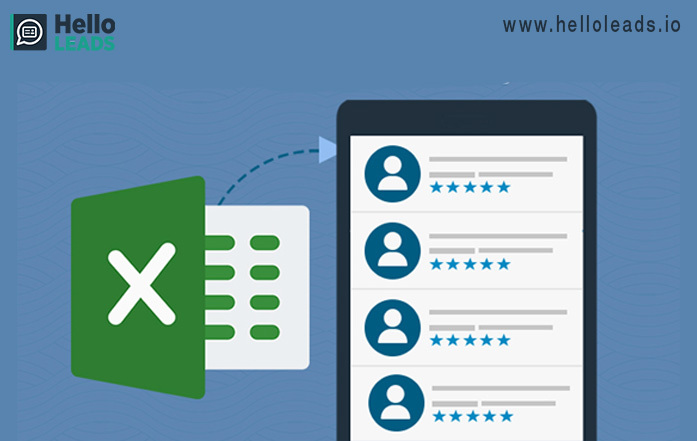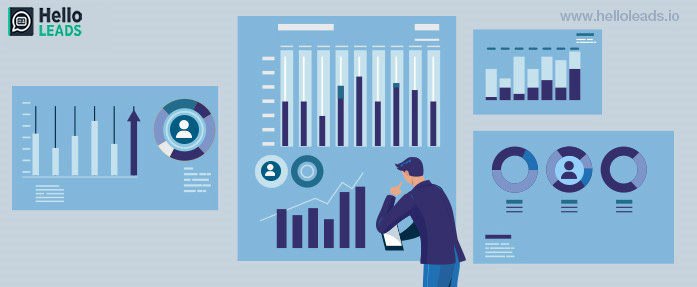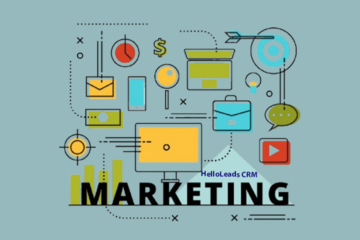
It is quite common that most of the small businesses use Excel or Spreadsheets to track their leads and customers. This is because excel or spreadsheet tools are quite simple and easy to onboard and use. And also, as these tools have a variety of options, people use them based on their business needs for lead tracking. Even though excel is the Convenient tool for lead tracking, many businesses are not aware of the importance of CRM for their business. Many small businesses also have confusion about migrating from Excel to CRM tools. To get a broader idea, let us deep dive into this topic.
Many organizations prefer to use excel because of its simplicity and with a few clicks, we can turn data into wonderful charts and data-driven materials. Even a few formulas will make our work easier.
Even though Excel has so many advantages, all of these are offset by some of the following drawbacks. Those are the reasons for which businesses should use CRM before its late to handle their data.
There has always been a debate among many businesses to migrate from excel to CRM. With more advantages, excel also comes with major disadvantages while handling customer data.
What is CRM Software?
CRM (Customer Relationship Management) is a tool that is designed to help the organizations to build a better relationship with their customers. CRM provides a complete picture of all customer interactions, keeping track of your sales, organizing, and prioritizing your tasks. Every business can experience a unique and seamless experience of handling customer data using CRM.
A CRM tool lets you store customer and prospect contact information, identify sales opportunities, record service issues, and manage marketing campaigns, all in one central location.
Who will get benefited from CRM?
Companies of all sizes from small to enterprise-level corporation who wants to drive the business growth in sales can be benefited from CRM tools and features. Especially a CRM is more beneficial to small businesses where teams forecast their sales which in turn helps to get more profit by closing more deals. Some businesses with a dedicated sales team, marketing team and seeking to increase efficiency gain more by using CRM.
Main reasons to consider CRM over excel

1.Lack of Security and Control
Many businesses practices to have a single excel sheet for handling all data. This will result in making excel into a larger size and increases the risks of sharing the data between team members. If you are using the same file for more than 2 users, it will be difficult to track the changes made and also the security of data is unassured. This for sure impacts the bottom line of your business.
2.Excel is Vulnerable to Fraud/Corruption
Fraudulent manipulation in excel files will result in the loss of data. If the data is lost, it is very difficult to retrieve the original data. Even if you retrieve the data, there might be a chance of missing data, which could not be retrieved.
3.Excel is difficult to troubleshoot or test
It is not infrequent to have spreadsheet data dispersed across multiple folders, workstations, or geographic locations. Though it is possible to pinpoint the location of all connected files, it will take more time to track the formula logic from one related cell to another. Similar issues may arise while troubleshooting any suspicious data.
4.Excel is not designed for collaborative work
Multiple exchanges of data files are common among business. It is also important to track the changes. Excel makes it difficult when a business expands across many countries or if the team members are split up by significant distance, the only option to exchange data is by email. Different team members will stumble to keep track of the comparable files as a result, people may work on an out dated version file.
5.Excel is hard to consolidate
The process of consolidation becomes hectic because of the report generated using an excel spreadsheet. The reports will be generated in different sheets and thus making it difficult to consolidate data in a single sheet which in turn requires many formulas and pivot tables.
6.Excel is difficult to manage
When a new person takes over as a part of a business change, he needs to start from the beginning. He needs to understand the concept and the formulas incorporated in excel before starting his work. This might take at least a week’s time for them to understand thus there might be a delay in work.
If you have a CRM, you can

- Have all data in one central place, accessible by all respective team members
- Respond more quickly to customer requests and needs
- Develop a strong long-lasting relationship through more personalized service
- Improves the lead management process, closing rates, and helps to keep a track of the sales activities which helps in improving the selling methodologies more quicker, easier and cost-effectively
- Increase profit and revenue, by extracting more value from the customer base and with more efficient and streamlined operations
- To enable sales, marketing, and customer service team to work together in achieving the common goal of being on the same page with customers
- To overcome excel disadvantages, you can pick the right CRM, suitable for your business and almost all CRMs provide options to migrate data from excel to CRM
Benefits of using CRM

1. Better Customer service
A CRM manages all of your contacts and gathers important customer information – like demographics, purchase records, and previous messages across all channels – and makes it easily accessible to anyone in your company who needs it.
2. Increased sales
A CRM tool can help you streamline your sales process, build a sales pipeline, automate key tasks and analyze all of your sales data in one centralized place, potentially increasing sales and productivity.
3. Improved customer retention
The CRM will provide sentiment analysis, automated ticketing, customer support automation, and user behavior tracking to help you determine problems and quickly address them with your customers.
4. Detailed analytics
CRM software typically has built-in analytic capabilities to contextualize data, breaking it down into actionable items and easily understood metrics.
5.Higher productivity and efficiency
CRM can show you a dashboard of how your business processes are working and where your workflows could improve.
6.Centralized database of information
Another thing CRM software does best is providing a centralized database with all information on your customers making it easily accessible to anyone in your company who needs it. This makes it easy for a sales representative to see what products a certain customer is interested in.
7.Managed communications with prospective leads
A CRM automatically manages the process, sending your employees alerts when they should reach out to the prospect and tracking every interaction, from emails to phone calls.
8.Improved customer segmentation
A list of hundreds of contacts can be overwhelming. A CRM will automatically segment your contact lists based on your criteria, making it easy to find the ones you want to contact at any given time.
9.Automated sales reports
The CRM can also help your team members evaluate their performance, track their quotes and goals, and check their progress on each of their projects at a glance.
10.More accurate sales forecasting
With any business operation, you should be able to review your past performance and strategically plan for the future. Using the automated sales reports in CRM software, you can identify key trends and get an idea of what to expect from your future sales cycle performance











